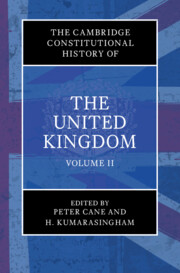Book contents
- The Cambridge Constitutional History of the United Kingdom
- The Cambridge Constitutional History of the United Kingdom
- Copyright page
- Contents
- Contributors
- Editors’ Preface
- 1 The Kingdoms of Anglo-Saxon England (450–1066)
- 2 England after the Conquest
- 3 England in the Thirteenth Century
- 4 England in the Fourteenth Century
- 5 England in the Fifteenth Century
- 6 England in the Sixteenth Century
- 7 The English Constitution in the Seventeenth Century
- 8 A European Perspective
- 9 Wales before Annexation
- 10 The Scottish Constitution before 1707
- 11 The Eighteenth-Century Constitution
- 12 The Constitutional and Parliamentary History of Ireland till the Union
- 13 The United Kingdom in the Nineteenth Century
- 14 The United Kingdom in the Twentieth Century
- 15 The Twenty-First-Century Constitution
- 16 Wales since the Annexation
- 17 Scotland in the Union
- 18 Ireland in the Union
- 19 The Making of Empire
- 20 Constitution and Empire
- Index
7 - The English Constitution in the Seventeenth Century
Crises of Inadequacy
Published online by Cambridge University Press: 12 August 2023
- The Cambridge Constitutional History of the United Kingdom
- The Cambridge Constitutional History of the United Kingdom
- Copyright page
- Contents
- Contributors
- Editors’ Preface
- 1 The Kingdoms of Anglo-Saxon England (450–1066)
- 2 England after the Conquest
- 3 England in the Thirteenth Century
- 4 England in the Fourteenth Century
- 5 England in the Fifteenth Century
- 6 England in the Sixteenth Century
- 7 The English Constitution in the Seventeenth Century
- 8 A European Perspective
- 9 Wales before Annexation
- 10 The Scottish Constitution before 1707
- 11 The Eighteenth-Century Constitution
- 12 The Constitutional and Parliamentary History of Ireland till the Union
- 13 The United Kingdom in the Nineteenth Century
- 14 The United Kingdom in the Twentieth Century
- 15 The Twenty-First-Century Constitution
- 16 Wales since the Annexation
- 17 Scotland in the Union
- 18 Ireland in the Union
- 19 The Making of Empire
- 20 Constitution and Empire
- Index
Summary
Even before the century had ended, battle was commenced over how its momentous events would be remembered. During the years 1698–1700 a series of Roundhead memoirs and treatises – the ‘Whig canon’ – were printed. They were devoted to ‘attacking the maintenance of standing armies by the state, inveighing against priestcraft, and asserting the primacy of the ancient constitution’.1 The publisher responsible for the project was John Danby, working closely with the radical intellectual John Toland. For Danby and Toland, these works demonstrated that the revolutionary events of the century had been validated by and were a vindication of England’s ancient constitution (which now needed protection against the encroachments of William III). Fire was quickly returned by the Tory press, which began publishing Royalist memoirs and the like. It was in the midst of this that the first publication of Clarendon’s great History of the Rebellion commenced, with the first volume appearing in 1702. Clarendon’s son, Laurence Hyde, commended his father’s role ‘in preserving the constitution of our government entire’. English government repudiated political violence: ‘the nature of our excellent government hath provided, in the constitution of it, other remedies, in a Parliamentary way’ to preserve the Crown’s prerogative and the liberties of the people. In particular – and this was a topical subject given the rise of politics out of doors in the later Stuart period – the Whig habit of ‘appealing to the people out of Parliament as it were to a fourth estate of the realm’ was shown to be ‘just another way of undermining the ancient and true constitution’.2
Keywords
- Type
- Chapter
- Information
- The Cambridge Constitutional History of the United Kingdom , pp. 160 - 186Publisher: Cambridge University PressPrint publication year: 2023

